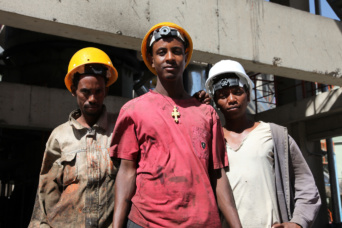- About
- Topics
- Picks
- Audio
- Story
- In-Depth
- Opinion
- News
- Donate
- Signup for our newsletterOur Editors' Best Picks.Send
Read, Debate: Engage.
A cocktail of a burgeoning middle class, the world’s youngest population and the availability of some of the most sought after natural resources have positioned Africa as a key player in global economics. This has aptly been captured in the ‘Africa rising’ narrative. Indeed, six of the world’s ten fastest economies are in Africa, researchers posit.
Yet behind the numbers and the glory is a story of a continent struggling to play catch up with the rest of the world. The impressive numbers are a stark contrast to the everyday realities. Growth as quantified by economists has been ephemeral at best. In response to this dichotomy, multilateral African Development Bank has been chaperoning a concept that tackles economic growth from both numbers and human development. Dubbed the High Five agenda, it is a focal point in marrying the UN’s sustainable development goals and the African Union’s Agenda 2063, both crucial commitments in uplifting the lives of millions of vulnerable people.
In a continent that is home to some 1.2 billion people, 120 million of them have no jobs at all, despite having the requisite training and skills. Four in every ten Africans live below the $1.25 poverty line and one in four in Sub Saharan Africa are malnourished. Some 635 million live without electricity. Yet such indicators count in oiling the wheels of economic transformation and holistic development.
What makes the High five agenda unique is its approach to identifying the five most unique goals that will turbocharge the continent in competing with the rest of the world while empowering all its populace: Light up and Power Africa; Feed Africa; Industrialise Africa; Integrate Africa; and Improve the Quality of Life for the People of Africa are the mortar and bricks of this transformative agenda. They are achievable but require the full support of both governments and the private sector.
In the words of Akinwumi Adesina, President of the African Development Bank, leadership has to be at the driving seat in translating the ambitions into tangible results. This cannot be allowed to be one of the many past strategic plans and development goals that only end up gathering dust. Everyone must breathe life to this initiative, for the sake of Africa.
Photo: Gavin Houtheusen/DFID (CC BY 2.0)
